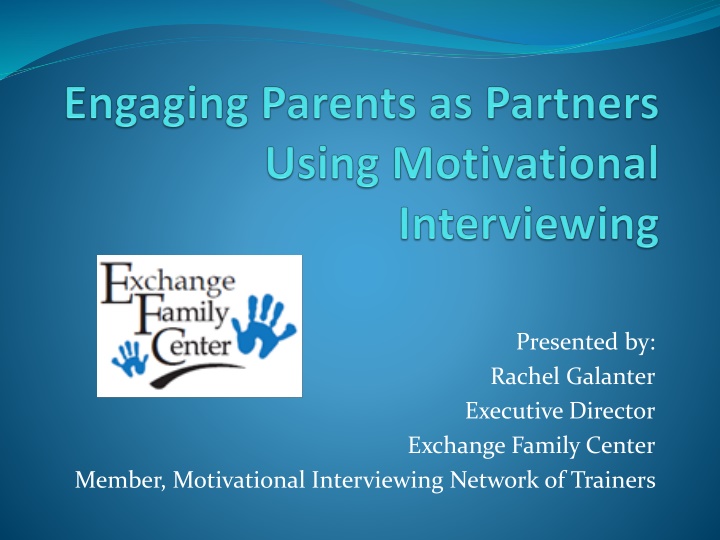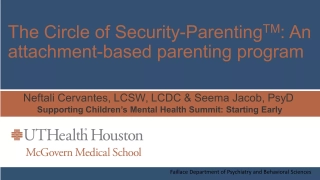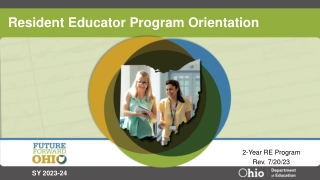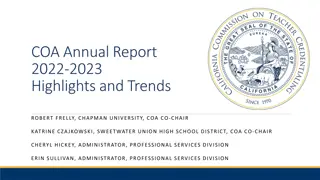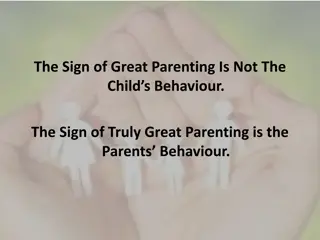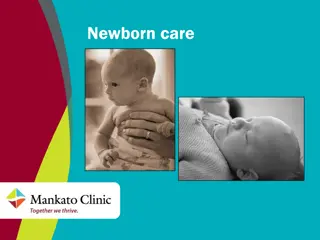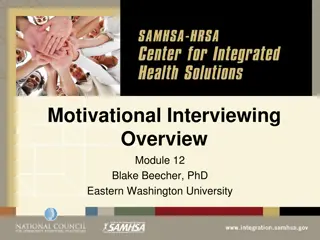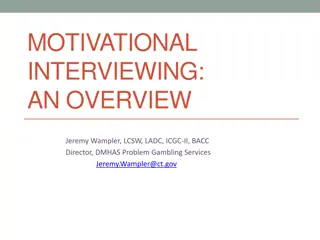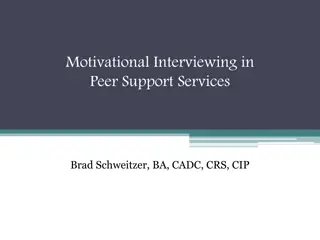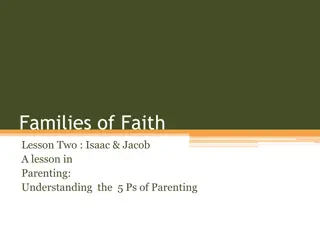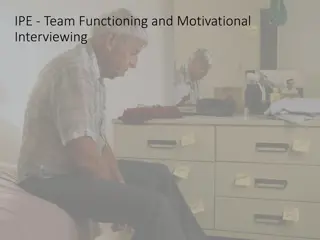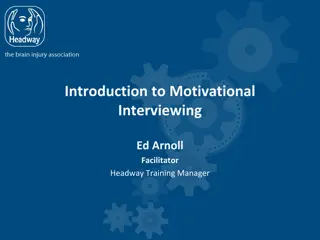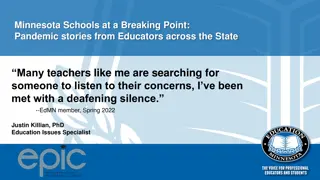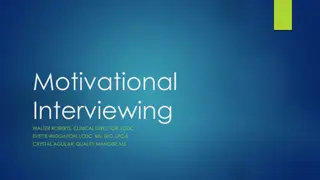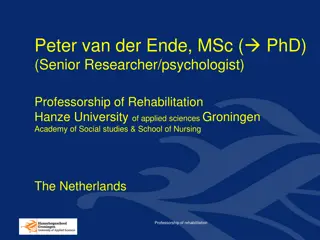Meet Rachel Galanter: Motivational Interviewing Expert and Parenting Educator
Rachel Galanter, MPH, a seasoned Executive Director at Exchange Family Center, is a certified Parenting Educator with extensive experience in working with children, youth, and families. She utilizes Motivational Interviewing techniques along with various proven models to help families overcome barriers and improve relationships. Rachel is a sought-after speaker at national conferences and has been recognized for her exceptional dedication to supporting families in creating nurturing environments. Dive into the world of Motivational Interviewing with this experienced trainer!
Download Presentation

Please find below an Image/Link to download the presentation.
The content on the website is provided AS IS for your information and personal use only. It may not be sold, licensed, or shared on other websites without obtaining consent from the author.If you encounter any issues during the download, it is possible that the publisher has removed the file from their server.
You are allowed to download the files provided on this website for personal or commercial use, subject to the condition that they are used lawfully. All files are the property of their respective owners.
The content on the website is provided AS IS for your information and personal use only. It may not be sold, licensed, or shared on other websites without obtaining consent from the author.
E N D
Presentation Transcript
Presented by: Rachel Galanter Executive Director Exchange Family Center Member, Motivational Interviewing Network of Trainers
Who is the trainer? Rachel Galanter (MPH, Maternal and Child Health), Exchange Family Center s Executive Director, is an NC Parenting Education Network certified Parenting Educator with over 25 years experience with children, youth, and families. She uses Motivational Interviewing, anger management, bio-feedback and the Community Resilience Model to help families address the stress and emotional issues that can be barriers to making change. She employs proven models Attachment Bio-Behavioral Catch Up, SafeCare, Language Is the Key, Triple P and Parent Child Interaction Therapy to help families transform and to improve relationships between caregivers and children. A member of the Motivational Interviewing Network of Trainers, she provides training and coaching to professionals on parent engagement, coaching, and cultural awareness. In addition to her local efforts, she is a sought-after speaker for national conferences including: the National Birth to Three Institute, the National Head Start Association Parent Engagement Institute, the National Exchange Clubs Symposium, and to her peers at the Motivational Interviewing Network of Trainers Forum. Prevent Child Abuse North Carolina awarded her the Donna J Stone award in 2013 for going above and beyond to support families in their efforts to provide their children with the safe, stable, nurturing environments they need if they are going to be successful.
Ill add fun graphics here And here . Introductions Your name Who is here with us? Your current job what Let s not forget the spectrum are you trying to motivate We are going to need a safe environment for practicing. others to change? Getting to know each other, what we bring to the table, and What your experience is what we need from each other with Motivational Interviewing? We are just working together to remind ourselves of what we What are your hopes already know. from Motivational Interviewing?
Health and Safety Quiz 1. Do you have a smoke detector in your home and change the batteries at least once a year? 6. Do you make sure every child who rides in your car up to 8 years old and 80 lbs is in an appropriate car seat or booster every time you drive? 2. Do you buckle up every time you are in a car, even in the back seat? 7. Do you have a fire extinguisher in your kitchen? 3. Do you exercise at least 30 minutes 3 times a week? 8. Do you floss daily? 4. Do you wear a bicycle helmet every time you ride a bike? 9. Have you practiced a fire safety plan at home and picked a meeting spot outside your home in case of fire? 5. Do you wear a personal flotation device every time you get in a boat? 10. Do you abstain from using your cell phone while driving?
Why dont we do what we know is healthy/safe? Not enough time Don t think the bad outcome will happen to us Think we re safe enough anyway Others aren t supportive Used to, but it didn t feel like it paid off Other reasons CONCLUSIONS: INFORMATION IS NOT ENOUGH OF A REASON TO DO THINGS WE ALL HAVE GOOD REASONS TO AVOID MAKING CHANGE
Motivational Interviewing (MI) is: a common sense, practical, evidence-based method originally used in substance abuse treatment then adopted for health behaviors . . . to partner with people to make and sustain behavioral 6
Where did Motivational Interviewing come from? Influenced by pyschologist Carl Rogers Empathy Unconditional positive regard Genuineness However, it is more directed on moving toward a goal
PACE is the Heart of Motivational Interviewing? Partnership working together with mutual respect Photo: EHS NRC 8
PACE Acceptance Absolute Worth: the person is valuable Accurate Empathy: the person is really heard Autonomy Support: the person gets to decide Affirmation: we pay attention, verbally acknowledge strengths, acknowledge barriers, demonstrate respect 9
PACE Compassion looking out for families best interests 10
PACE Evocation elicit ideas and potential plans from families instead of providing them 11
PACE The Heart of Motivational Interviewing The keys to engagement Partnership Acceptance Compassion Evocation 12
Who is Driving the Car? Showing you are really ok with that . . . Photo: EHS NRC 13
PERSUASION EXERCISE (thanks to Thomas Gordon) Listener, find out what the change is that the person is considering and then 1. Explain why the person should make this change 2. Give at least 3 specific benefits that would result from making the change 3. Tell the person how they could make the change 4. Emphasize how important it is for them to make the change (may include negative consequences of not changing) 5. Tell/persuade the person to do it 6. Repeat the above more emphatically if you encounter resistance
How do you this our volunteer felt being persuaded? appreciated? scolded? shamed? talked at? motivated?
How likely is the volunteer to follow Rachel s advice? Not going to do it Unlikely Possibly Very likely Definitely
Based on this conversation, will this person prioritize talking to Rachel again? No, he/she will avoid Rachel. He/She will only respond if there is a deadline. He/She will only respond if there is a penalty if she doesn t. He/She will happily return Rachel s calls, but not show up for the appointments. He/She will set up and make new times to meet with Rachel.
Now check in: First the person being persuaded: How did you feel? Did you move toward or away from change? Do you want to talk about this more with this person? The person who persuaded: How did you feel? Did you think the person moved toward or away from change? Observer Did the persuader use all the techniques (give details)? What did you see happening? Do you think the person moved toward or away from change?
A Taste of Motivational Interviewing (thanks to Bill Miller) Speaker, identify something you feel two ways about, tell the listener about this possible change Listener do the following 6 steps: 1. Why would you want to make this change? 2. If you did decide to make this change, how might you go about it in order to succeed? 3. What are the three best reasons for you to do it? 4. How important would you say it is for you to make this change, on a scale from 0 to 10, where 0 is not important and 10 is extremely important? 5. Why are you at ____ rather than at 0? 6. After you have listened carefully to the answers to these questions, give back a short summary of what you heard of the person s motivations for change, 7. Then ask: so what do you think you ll do?
How do you this our volunteer felt after this conversation? appreciated? scolded? shamed? talked at? motivated?
How likely is the volunteer to take steps toward change? Not going to do it Unlikely Possibly Very likely Definitely
Based on this conversation, will this person prioritize talking to Rachel again? No, he/she will avoid Rachel. He/She will only respond if there is a deadline. He/She will only respond if there is a penalty if she doesn t. He/She will happily return Rachel s calls, but not show up for the appointments. He/She will set up and make new times to meet with Rachel.
Now check in: First the person considering change: How did you feel? Did you move toward or away from change? Do you want to talk about this more with this person? The person who did Motivational Interviewing: How did you feel? Did you think the person moved toward or away from change? Observer Did the person using MI use all the techniques (give details)? What did you see happening? Do you think the person moved toward or away from change?
Motivational Interviewing & Persuading Motivational Interviewing Persuading Let s explore your reasons for change together. The reasons you don t want to do this aren t important. 24
Motivational Interviewing & Persuading Motivational Interviewing Persuading This is a hard decision with both benefits to changing and reasons to keep things how they are. There is one easy answer, and I m going to get you to make a good change. 25
Motivational Interviewing & Persuading Motivational Interviewing Persuading You know what s best for you and you are capable of good choices. I know what s best for you I am an expert (and you aren t). 26
Reflecting on our practices Which method is more common and why is that? How does pressure from supervisors or other managers affect how we approach families? How effective are the methods we use? Are they engaging families? Do they convey respect for families and of what they are capable of ?
What are we trying to evoke? CHANGE TALK Does the person want to change? (Desire) Does the person feel able to change? (Ability) Does the person see reasons to change? (Reasons) Does the person feel the need to make change? (Need) Is the person committed to change? (Commitment) Is the person taking action to prepare for change? (Action) Is the person taking steps to make change? (Taking Steps) DARN CAT
CHANGE TALKDARN CAT Does the person want to take this step? Desire I want to do this! 29
CHANGE TALKDARN CAT Does the person feel able to take this step? Ability I can do this! 30
CHANGE TALKDARN CAT Does the person see reasons to take this step? Reasons If I do this, my daughter will be a better reader! 31
CHANGE TALKDARN CAT Does the person feel the need to take this step? Need I have to take this step! 32
CHANGE TALKDARN CAT Does the person commit to take this step? Commitment I will take this step! 33
CHANGE TALKDARN CAT Did the person take an action that prepares them? Action I got a library card. 34
CHANGE TALKDARN CAT Has the person started? Taking Steps I have started this step! 35
Successful Uses of Motivational Interviewing Substance use (tobacco, alcohol, other drugs) Gambling Diet Exercise Safe sex Engaging in therapy/treatment (medication compliance, parenting classes, etc.) Photos: Microsoft Clip Art 36
Curry, Ludman, Graham, Stout, Grothaus, & Lozano (2003) Archives of Pediatrics & Adolescent Medicine Mothers who received brief MI were less likely to have smoked during the 7 days prior to follow up. Not Smoking 3 months later 12 months later 7.7% 3.4% Motivational Interviewing As usual intervention 13.5% 6.9%
Chaffin, Funderburk, Bard, Valle, & Gurwitch (2010) Journal of Consulting and Clinical Psychology Technique followed by: percent with new reports to child welfare (1) motivational techniques + Parent Child Interaction Therapy (PCIT): 29% (2) motivational techniques + group parenting classes: 34% (3) educational information + group parenting classes: 41% (4) educational information + PCIT: 47% Educational information: about the role of child welfare, definitions of child maltreatment, and exploring the roots of parenting practices Parents were randomly assigned to PCIT or a traditional parenting class and six introductory sessions of either motivational enhancement or information and education about parenting.
How much Motivational Interviewing do you need? Could be a small number of sessions in front of a service Could be a small amount of time in a session focused on other things Could be the intervention you receive
Where do I learn more about Motivational Interviewing? http://www.motivationalinterviewing.org/motivational- interviewing-resources to see studies http//toothtalk.web.unc.edu/resource to see video of Early Head Start workers trying to use Motivational Interviewing in role plays around dental health scenarios webcast.ucdavis.edu/llnd/176c5ce6 to see video of practitioners providing Motivational Interviewing in role- plays of child welfare scenarios http://iprc.iu.edu/training/courses/intro-to-MI/ to see another intro webinar http://mi.kajabi.com/fe/84313-pesi-healthcare-free-ce to see videos of the 4 processes of MI in action
Motivational Interviewingwhat do you do with the heart and spirit? Conversational style to partner Ask Open-ended Questions to evoke Affirm to demonstrate compassion/acceptance Develop Discrepancy to evoke Reflect to empathize and roll with resistance Direction: helping move from one stage to the next Use Past Successes to support self efficacy Evoke Change Talk to amplify ambivalence
How do I do this with the people I work with? Open ended questions (but not more than 2 in a row) Affirmations Reflections Summaries OARS
OPEN-ENDED vs. CLOSED Questions OPEN QUESTIONS CLOSED QUESTIONS Ask for a specific piece of information Allow us to gather information, but aren t asking for sharing of bigger ideas Do you , Can you , How many , How often are common closed question starters Give people a chance to talk, explain, think out loud Can t be answered yes/no Can t be answered with a number or one word 43
OPEN-ENDED vs. CLOSED Questions Did you cover all the steps on the checklist? CLOSED Tell me about how you think things went in terms of following your plan. OPEN 44
OPEN-ENDED vs. CLOSED Questions Did you make an appointment for his shots? CLOSED Tell me about your plan to get him his shots. OPEN 45
OPEN-ENDED vs. CLOSED Questions What are your three best reasons to get places on time? OPEN Did you know you ve been late five times this month? CLOSED 46
OPEN-ENDED vs. CLOSED Questions How many days a week do you exercise? CLOSED When you ve decided to exercise regularly, what made it work? OPEN 47
Develop Discrepancy I m curious . . . I m confused . . . Help me understand . . .
Affirmations (Labeled Praise for Adults) Help person see and build on success Demonstrate compassion or sympathy for difficulties Build positive feelings People like more when they are learning a new skill Are like salt
Reflections Reflecting is holding mirror to what the person said - - - - building alliance letting the person hear another person say it. checking in to be sure you understood also known as active listening
